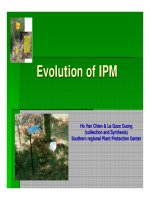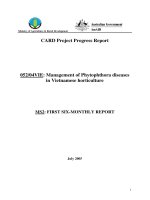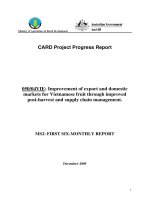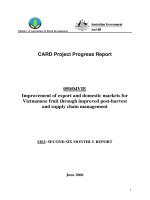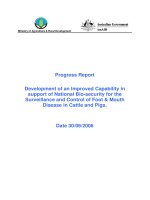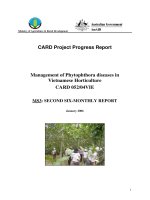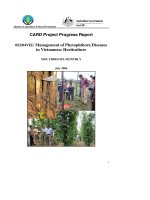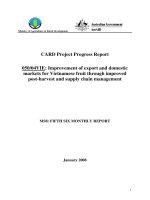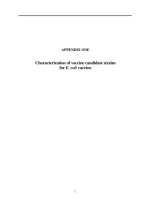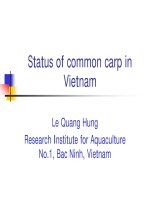Báo cáo nghiên cứu khoa học " Management of Phytophthora diseases in Vietnamese horticulture - MS2 " potx
Bạn đang xem bản rút gọn của tài liệu. Xem và tải ngay bản đầy đủ của tài liệu tại đây (78.32 KB, 8 trang )
Ministry of Agriculture & Rural Development
CARD Project Progress Report
052/04VIE: Management of Phytophthora diseases
in Vietnamese horticulture
MS2: FIRST SIX-MONTHLY REPORT
July 2005
1
1. Institute Information
Project Name
Management of Phytophthora Diseases in
Vietnamese Horticulture
Vietnamese Institution
National Institute of Plant Protection, Hanoi
Vietnamese Project Team Leader
Dr Nguyen Van Tuat
Australian Organisation
The University of Sydney
Australian Personnel
Professor David Guest
Date commenced
April 2005
Completion date (original)
December 2006
Completion date (revised)
April 2007
Reporting period
First 6 months
Contact Officer(s)
In Australia: Team Leader
Name:
Professor David Guest
Telephone:
(02) 9352.3946
Position:
Professor of Horticulture
Fax:
(02) 9351.4172
Organisation
The University of Sydney
Email:
In Australia: Administrative contact
Name:
Luda Kuchieva
Telephone:
02.93517903
Position:
Grants Officer
Fax:
02.93517903
Organisation
The University of
Sydney
Email:
In Vietnam
Name:
Dr Nguyen Van Tuat
Telephone:
+84 4838 5578
Position:
Director
Fax:
+84 4836 3563
Organisation
National Institute of Plant Protection
Email:
2
2. Project Abstract
The effective management of Phytophthora diseases in Vietnam is currently limited by
the lack of knowledge and understanding at the scientific, extension and farmer levels.
This project aims to extend sustainable and effective disease control and management
recommendations to a range of horticultural crops throughout Vietnam, thereby
improving smallholder outcomes by reducing crop losses due to Phytophthora. The first
milestone of this CARD project has been completed and relevant activities are described.
The first in a series of two Scientific Training Workshops were held at NIPP-Hanoi,
FTRDC-Hue and SOFRI-My Tho in Vietnam between May 31
st
and June 13
th
, 2005. An
initial survey was conducted to assess the competency of institutional staff and the
effectiveness of the workshop series. A Training Manual was developed and distributed to
participants providing an ongoing reference. Workshop participants were trained in
pathogen identification, disease diagnosis, farm management and disease control methods
and participatory research extension techniques. Participants will establish short research
projects to develop integrated disease management recommendations for implementation
by farmers in the next milestone of the project. Results from these projects will be
discussed at the next workshop. In completing these activities we have met the targets set
in the first milestone.
3. Executive Summary
This project aims to extend sustainable and effective disease control and management
recommendations developed in previous research, to a wide range of horticultural
crops throughout Vietnam, thereby improving smallholder outcomes by reducing crop
losses due to Phytophthora diseases. This report describes the first in a series of two
scientific training workshops held at the National Institute for Plant Protection
(NIPP)-Hanoi, Fruit Tree Research and Development Centre (FTRDC)-Hue and
Southern Fruit Research Institute (SOFRI)-My Tho, Vietnam, between May 31 and
June 13, 2005. The workshops were attended by 77 scientists and extension workers
from universities, research institutes and extension agencies in the north, centre and
south of Vietnam. The gender balance of participants was tipped towards males with
41% of participants at all three workshops being female.
A survey was conducted at the beginning of each workshop to assess the competency
of institutional staff and the effectiveness of the workshop series using Bennett’s
Hierarchy. This information, along with the farmer surveys to be conducted in the
extension workshops, will enable us to assess the impact of the training workshops
and the CARD project.
A Training Manual was developed and distributed at each workshop, along with
copies of ACIAR Monographs 99 “Developing Agricultural Solutions with
Smallholder Farmers” and 114 “Diversity and Management of Phytophthora in
Southeast Asia”. A hardcopy and an electronic copy of the training manual are
submitted as attachments with this report. The training manual includes all
presentations from the workshops and additional information about Phytophthora
diseases and their management taken from ACIAR Monograph 114. It was well
received and provides a comprehensive future reference point for participants.
3
The three day scientific Training Workshops provided a hands-on approach to
diagnosis and management of Phytophthora diseases in Vietnam. Workshop
participants were trained in pathogen identification, disease diagnosis, disease control
methods and PAR. Lecture sessions introduced participants to the a variety of
Phytophthora species and the diseases they can cause on a range of plants, the impact
of Phytophthora diseases in Southeast Asia, the concepts of disease diagnosis,
pathogen isolation and identification, disease epidemiology and disease cycles.
This information was put into practice when participants went out into the field to
identify diseased plants and collect material for laboratory analysis. In the laboratory
participants learnt several techniques to isolate Phytophthora from soil and plant
material and to identify Phytophthora as the causal organism of the disease.
Group discussions were held to discuss current disease incidence and management
strategies. This was followed by a group discussion session to develop a selection of
disease low-, medium- and high-input management options to present to farmers as
part the extension recommendations and participatory research. This information
provides participants with the capacity to conduct extension workshops in the next
phase of the project where participants will establish short research projects based on
participatory research (PAR) to develop integrated disease management
recommendations for farmers. Results from these projects will be discussed at the
next workshop.
The information presented in this report addresses the targets required to fulfil the first
milestone of the CARD project.
4. Introduction & Background
The geographic and climatic diversity in Vietnam allows a broad range of plant
species to be grown. Tropical fruit trees are concentrated in the northern and southern
parts of Vietnam and temperate crops in the northern and central highlands. The
diverse climatic regions also provide an ideal climate for Phytophthora spp to
flourish, and the genus Phytophthora is responsible for extensive economic damage in
a wide range of different horticultural crops throughout the country, resulting in large
reductions in yield and significant economical losses.
Information on the occurrence and distribution of Phytophthora species present in
Vietnam, disease transmission and progression, and suitable control methods is
lacking. Expertise in the diagnosis and management of Phytophthora diseases,
including appropriate quarantine procedures, is also poor. A strategic approach to the
future study and control of Phytophthora diseases is needed. This project aims to
improve smallholder productivity and alleviate poverty, especially in the Mekong and
Central Coast regions, by improving the skills of relevant scientific and extension
staff and their capacity to implement disease management recommendations with
smallholders.
This project focuses on local disease problems identified by informal surveys and
smallholder demand. In the south, the priority crops were identified as pineapple,
citrus, and black pepper, while citrus, black pepper and rubber will be the main focus
in the centre, and litchi, tomato and potato in the north. The Australian and
Vietnamese project team will run a series of workshops and supervise short on-farm
research projects. Our workshops aim to fill the current gaps in knowledge of
Phytophthora diseases at all levels in Vietnamese horticulture. Scientific workshops at
4
each site will include staff of the three collaborating institutes as well as relevant staff
from universities. These workshops will focus on the biology of Phytophthora, the
diseases it causes, and potential management practices. Staff will be trained in
diagnosis at the field and laboratory levels. In this way knowledge gained from these
workshops will be incorporated into undergraduate and postgraduate training
programs. The first Scientific Training workshops were held at the National Institute
for Plant Protection (NIPP)-Hanoi, Fruit Tree Research Development Centre
(FTRDC)-Hue and Southern Fruit Research Institute (SOFRI)-My Tho in June 2005.
The final training Scientific Training Workshop to be organised by the Australian
partners is scheduled for October 2006. These hands-on training workshops will
contribute to capacity building in the research and extension institutes involved.
Scientific staff will then be equipped to transfer diagnostic skills and Phytophthora
disease management strategies to extension agencies.
The second level of workshop will focus on symptom recognition and the application
of integrated management to smallholders. Vietnamese scientific staff will run
workshops for Provincial Plant Protection Sub-Division (PPSD) staff, who will then
supervise participatory research and other extension activities involving smallholder
farmers. The crops identified above will form the basis of the research extension
activities. The Australian partners will visit field sites in February 2006, to support
research and extension staff in the development of integrated disease management
strategies for each crop in each region, the design and implementation of
Phytophthora training workshops for provincial PPSD extension workers in each
region and the design and implementation of PAR and other extension activities
involving PPSD staff and smallholders. Workshop participants will present the results
of their participatory research trials at the final workshop scheduled for October 2006.
The third level of training in Vietnam will disseminate the results to smallholders in 5
provinces in each region through Participatory Action Research (PAR) methodologies
learned during this and previous projects. Farmers will be offered a range of farm
management strategies and will be supported in their implementation of the chosen
strategy. These farmers will become a focus for future extension activities. Farmer
competitions, field days and GP exercises will supplement these participatory
activities.
Selected staff will also be given an opportunity to undertake a study tour to Australia
where they will learn about nursery best practice and orchard management, as well as
advanced techniques in pathogen identification and research training. Three scientists,
Mrs Nguyen Thi Ly (NIPP), Mr Doan Nhan Ai (FTRDC), Dr Nguyen Van Hoa
(SOFRI), will visit Australia in July 2005 to participate a training and study tour to
examine nursery best practice and horticultural production in southern Queensland,
and for further training in Phytophthora diagnostics. This will build institutional
capacity and aims to maximise the long-term benefits to each institution.
5. Progress to Date
5.1 Implementation Highlights
A detailed implementation of the project progress to date is provided in the attached
Progress Report Logframe.
The first milestone has been reached with the following targets already implemented:
5
1. Contract signing in April 2005.
2. Signing of an MOU between Australian and Vietnamese project leaders.
3. Development and distribution of Training Manual.
4. Initial assessment of competency of Vietnamese institutional staff by conducting
questionnaires at the beginning of the first workshop. A similar questionnaire will
be distributed in the final workshop to assess the effectiveness of the scientific
training activities using Bennett’s Hierarchy.
5. Completion of first scientific training workshops at NIPP-Hanoi, FTRDC-Hue and
SOFRI-My Tho. A Scientific Training Workshop program can be found in
Appendix I.
6. Training of 77 Vietnamese scientists in disease diagnosis and the identification of
Phytophthora.
7. Planning of Vietnamese scientific visit to Australia in July, 2005.
5.2 Capacity Building
1. Scientific training workshops
The Training Workshops in this project aim to fill the current gaps in knowledge of
Phytophthora diseases at all levels in Vietnamese horticulture. Hands-on Scientific
Training Workshops held at NIPP, FTRDC and SOFRI included a total of 77 staff
from these collaborating institutes, universities, provincial Plant Protection
Departments and Vietnam Agricultural Science Institute (VASI). The inclusion of
university staff will further promote the incorporation of knowledge gained from these
workshops into undergraduate and postgraduate training programs.
The Scientific Training Workshops focused on the biology of Phytophthora, the
diseases it causes and a range of management practices (Appendix I). Scientists who
participated in the first Training Workshop were trained in symptom diagnosis at the
field and laboratory levels resulting in improved institutional capacity for disease
symptom diagnosis, pathogen identification, research and recommendations.
Scientists were also introduced to the technique of Participatory Action Research
(PAR) for farmer training and dissemination of disease control methods. This will
improve the capacity for conducting extension training and the diffusion of
management strategies into farming communities. The Scientific Training Workshop
also introduced participants to potential quarantine and future disease risks in
Vietnamese horticulture providing participants with the ability to not only address
current problems but also to develop a capacity to respond to new disease problems as
they arise.
The study tour planned for July 2005 will expose Vietnamese scientists to nursery and
horticultural production best practice techniques as well as advanced techniques in
pathogen identification and research training. Scientific staff will then be equipped to
transfer diagnostic skills and Phytophthora disease management strategies to
extension agencies through extension workshops and farmer training programs.
2. Training Manual
A comprehensive training manual was developed and provided to workshop
participants as both a hard copy and an electronic copy (CD). The manual included
copies of all presentations, some of which were translated into Vietnamese and
translations of selected relevant chapters of ACIAR Monograph No 14 (Drenth A &
Guest DI, 2004. Diversity and Management of Phytophthora in Southeast Asia). The
distribution of the manual primarily in English was preferred at SOFRI to encourage
participants to learn English.
6
Participants were also provided with a copy of the ACIAR Monograph in English.
The Monograph provides a comprehensive background, practical information and
advice for the development and implementation of effective integrated management
strategies for Phytophthora diseases occurring on a variety of crops under different
environmental conditions. Participants were also provided with copies of the
Vietnamese translation of ACIAR Monograph 99 “Developing Agricultural Solutions
with Smallholder Farmers”. This monographs outlines PAR approaches designed to
encourage farmer adoption of new technologies.
The development and distribution of a comprehensive training manual and the
ACIAR Monographs Nos 99 and 114 provide participants with guides to which they
can refer as the need arises.
3. Scientific study tour of Australia
An advanced training tour of Australia is scheduled for July 2005. Three Vietnamese
scientists were selected by the Vietnamese project leaders to participate in a training
and study tour to examine nursery best practice and horticultural production and for
further training in Phytophthora diagnostics. This will build institutional capacity and
aims to maximise the long-term benefits to each institution.
6. Report on Cross-Cutting Issues
6.1 Environment
The current lack of disease management information in many areas of Vietnam may
lead to inappropriate use of pesticides. Application of chemicals for pest and disease
control can lead to high residues in food and environmental pollution. Many
participants at the workshop in My Tho raised environmental issues as a major
concern of farmers. For example in Hanoi, Hatay and Vinh Phuc Provinces, farmers
have been reported to apply 2-3 times the recommended rate of fungicides to potato
and tomato crops every 3-5 days during the cool season.
Our approach to integrated disease management of Phytophthora diseases has
minimal chemical inputs and is generally beneficial to the environment. The approach
is based on accurate disease diagnosis, improved nursery practice to ensure farmers
are supplied with high-quality, disease-free planting material, adequate farm
preparation to improve soil drainage and increase soil organic matter and the activity
of beneficial soil microbes, quarantine and farm hygiene to minimise pathogen
dissemination, the use of organic composts and manures to maintain soil fertility and
increase water-use efficiency, improved drainage and canopy aeration to reduce
humidity and pathogen sporulation. In some cases strategic application of
phosphonate fungicides may be appropriate. The tailoring of specific
recommendations for particular crops enables precise treatment of diseases preventing
environmental spillage. It also promotes capacity building and the ability of
Vietnamese scientists and extension staff to respond to new problems as they arise.
The technologies in our approach are not dissimilar to traditional farming systems and
have beneficial rather than negative environmental impacts for example, by improving
soil organic matter, reducing unnecessary or inappropriate pesticide and fertiliser
application.
6.2 Gender and Social Issues
A greater proportion of participants at the three workshops were male (59%). This
was largely due to the large number of males (82%) attending the workshop at
7
FTRDC. A greater proportion of participants at the NIPP were female, while at
SOFRI the balance was more evenly distributed.
7. Implementation & Sustainability Issues
7.1 Issues and Constraints
Minor issues have been dealt with as they occurred:
• Delay in signing research agreement and transfer of funds
• Delays in transfer of money to Vietnam
• Communication confusion and indecision for purchase of airfares and
allocation of allowances for scientific visit
7.2 Options
Tasks to meet the first milestone have been completed. The project is running well
and no changes need to be made.
8. Next Critical Steps
The activities that will be undertaken in the next six months are:
1. Scientific training tours of Australia for three Vietnamese scientists
2. Organise extension training workshops an identify participants in each region
3. Conduct extension training workshops in each region
4. Establish experiments to develop integrated disease management techniques
5. Organise farmer training and PAR and identify locations
a. Promote awareness amongst farmers and recruit participants
b. Run PAR and GP activities in 15 provinces
6. Review farmer training and extension activities
7. Finalise purchase and delivery of microscopes, projectors and laptop computers
Mr Doan Nhan Ai did not get his visa in time to join the scientific tour in July 2005
and will instead visit Australia for scientific training in 2006.
9. Conclusion
This project aims to improve smallholder outcomes by reducing crop losses due to
Phytophthora diseases through extension of sustainable and effective disease control
and management recommendations for a wide range of horticultural crops throughout
Vietnam. The first of a series of workshops were held at NIPP, FTRDC and SOFRI in
June 2005 and were attended by 77 scientists and extension workers from universities,
research institutes and extension agencies. The hands-on approach to teaching and
learning in the workshops will contribute to capacity building in the research and
extension institutes involved. Scientific staff are equipped to transfer diagnostic skills
and Phytophthora disease management strategies to extension agencies. Incorporation
of the knowledge gained from these workshops into undergraduate and postgraduate
training programs will enhance the capacity of future scientists and extension works
to address current future disease risks.
In completing these activities we have successfully addressed the first milestone.
8
